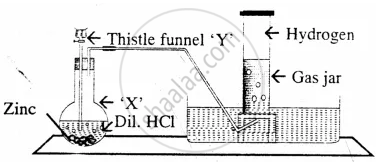Advertisements
Advertisements
Question
Starting from zinc how would you obtain hydrogen using a dilute acid.
[Give balanced equation & name the product formed in the case other than hydrogen].
Name a metal which will not react with the reactants above to give hydrogen.
Solution
With dil. acids: Metals like Zn, Fe, Pb form corresponding salt.
\[\ce{Zn + dil.2HCl -> \underset{\text{Zinc chloride}}{ZnCl2 + H2}}\]
\[\ce{Fe + H2SO4 -> \underset{\text{Ferrous sulphte}}{FeSO4 + H2}}\]
\[\ce{Pb + 2HCl dil. ->\underset{\text{Lead chloride}}{PbCl2 + H2}}\]
Cu and metals below Cu do not react with dil. acids.
APPEARS IN
RELATED QUESTIONS
Give reason for the following:
Nitric acid not used for the preparation of hydrogen gas?
Name the following:
A metal which liberates hydrogen only when steam is passed over red hot metal.
How is hydrogen gas collected? Why?
How would you show that hydrogen is a non-supporter of combustion?
Why is granulated zinc preferred in the laboratory preparation of hydrogen?
Give a balanced equation for the following conversions sodium plumbite from lead.
In the laboratory preparation of hydrogen from zinc and dil. acid. Give a reason for the following:
The lower end of the thistle funnel should dip below the level of the acid in the flask.
Give a reason for the following.
Nitric acid in the dilute form is not used in the laboratory preparation of hydrogen from metals.
Name the following.
A gaseous reducing agent which is basic in nature.
The diagram represent the preparation and collection of hydrogen by a standard laboratory method.

State what difference will be seen if pure zinc is added in the distillation flask ‘X’ instead of granulated zinc.
